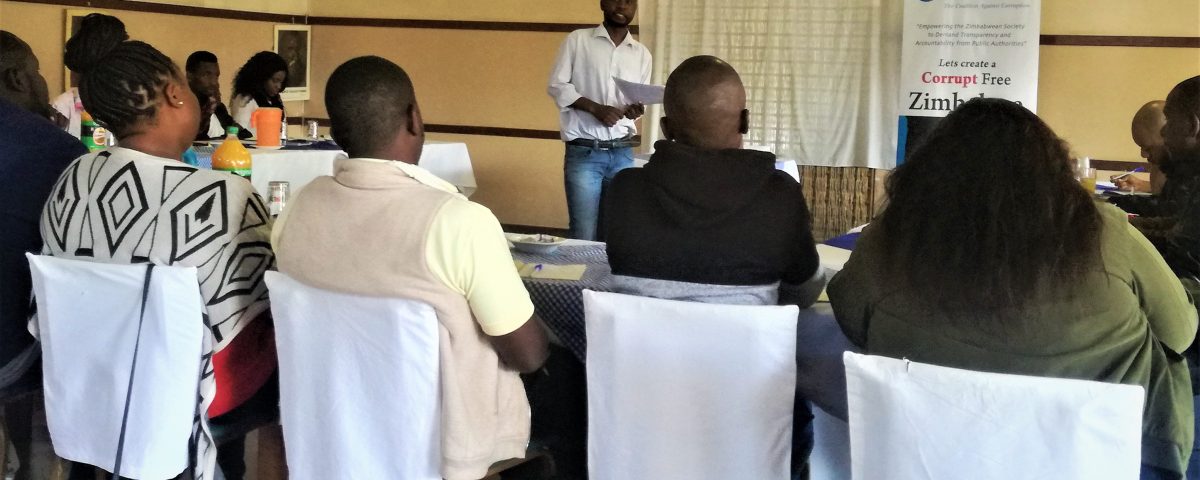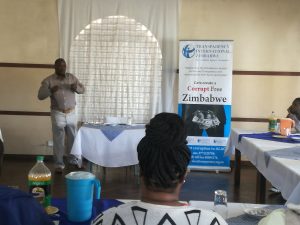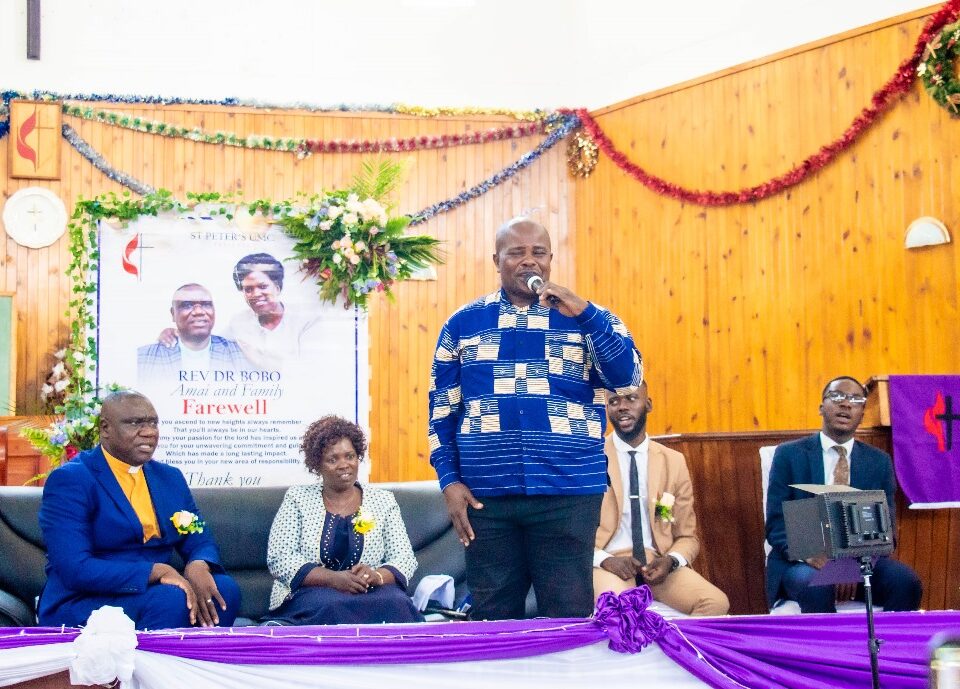
MultiChoice Talent Factory (MTF) networking portal introduces instant messaging feature
May 28, 2019
Locally shot movie ‘Goodman’ gets rave reviews, as director eyes big
June 6, 2019‘Investigative journalism key to unearth, combat corruption in Zim’

Hardlife Zuweni from Diamond FM presenting during the Transparency International Zimbabwe (TI-Z) refresher workshop held last week Wednesday for Manicaland journalists.
Ngoni Dapira
JOURNALISTS were urged to uphold their watchdog role through investigative journalism to help combat the high levels of institutionalized corruption in both the public and private sector in Zimbabwe.
This was said last week Wednesday during an investigative journalism refresher training held in Mutare organized by Zimbabwe chapter of the global anti-corruption watchdog, Transparency International.
Transparency International Zimbabwe (TI-Z) research and advocacy officer Sam Matikiti said they have been running a series of anti-corruption awareness campaigns countrywide to help the ongoing endeavours to create a corrupt free Zimbabwe, with focus on enlightening and empowering the Zimbabwean populace to demand transparency and accountability from public authorities as a constitutional right.
During the refresher course presentations, journalists were encouraged to make use of new-age media platforms which have more outreach such as social media platforms like Twitter and Facebook to whistle blow ‘sensitive’ stories that are sometimes ‘censored’ from publication due to gatekeeping systems in both public and private conventional media houses.
“Investigative journalism is important because it tries to discover information of public interest that someone or some organisations are trying to hide. The practice aims at exposing public maters concealed either deliberately or accidentally of which often the community will be disadvantaged by not knowing the information,” said Matikiti.
Zimbabwe is ranked 160 least corrupt nation out of 180 countries, up from 157 in 2016, according to the 2018 Corruption Perceptions Index by Transparency International. The Corruption Perceptions Index (CPI) ranks countries and territories based on how corrupt their public sector is perceived to be. The CPI for Zimbabwe since 2016 has however remained stagnant after it slightly went up to 42.61 from 42.01. The country reached an all-time high of corruption rank of 166 in 2008 and a record low of 43 in 1998. The CPI works on a scale of 0 (highly corrupt) to 100 (very clean).
Hardlife Zuweni from the Mutare based radio station Diamond FM presenting on investigative journalism in broadcasting said despite notable efforts by the media over the years to unearth multi-million dollar corruption scandals, it was disheartening that in most cases perpetrators walk the streets free or some cases remain in limbo for years.
“It hurts that you wind up hearing one has been arrested, given bail then the next thing if it’s a politician you will hear the person is posted outside the country as an Ambassador. Journalists are therefore frustrated by such happenings, where top politicians or business tycoons end of day walk free due to their connections. At times, the journalist is even threatened or fired from work…However, lets not be discourage but keep on being the watchdog for society to expose corruption and any other malpractices’ in our communities,” said Zuweni.
In his presentation, The Manica Post correspondent based in Chipinge Luthando Mapepa said print media has over the years played a leading role to expose corruption in Zimbabwe citing the Willowgate scandal of 1988 as a prime example that showed how investigative journalism plays a key role as a true watchdog for society.
“The Willowgate scandal rocked the country following the exposure of government officials who were given preference in buying vehicles at the Willowvale Motor Industries at discounted prices and re-selling them at very inflated prices. The ensuing investigation from the article resulted in the resignations of five members of President Robert Mugabe’s cabinet. One of the five, Maurice Nyagumbo, later committed suicide after being charged with perjury,” said Mapepa.
Other journalists in attendance gave examples of other high-profile investigative journalism scandals uncovered such as the Salarygate of 2013 that exposed how parastatal executives and their respective boards awarded themselves hefty salaries and allowances as well as the 2011 Asiagate match fixing scandal that involved players and officials of the Zimbabwe national football team, among many others.
During the workshop, as a way forward journalists suggested that civic society organisations and Non-Governmental Organisations (NGO’s) should capacitate journalists in the ongoing anti-corruption drive by funding investigative stories and annually bankrolling investigative journalism media awards as an incentive for reporters to go the extra mile and dig deeper to expose corruption in the country.

Freelance journalist Clayton Masekesa presenting at the workshop.
Freelance journalist Clayton Masekesa in his presentation on how freelance journalists play a pivotal role in investigative journalism said independent media journalists have always been at the front to expose graft in public institutions. He however expressed concern about how corruption is deep-rooted in all spheres of activity in the country which threatens the lives of journalists that want to sniff around.
Masekesa said most of the distinguished investigative journalists from Zimbabwe were ‘nonentities’ whilst some winded up fugitives, regardless of the impact of their great work. “We have seen that those that are corrupt are represented in every step of the justice system and that getting matters even to commence as trial is a matter that involves many corruption hurdles. This threatens the lives of the reporters in most cases. We look at the reporter Basilton Peta who exposed many controversial stories and was forced to flee the country in 2002 after receiving many death threats from government. Following the Willowgate scandal of 1988, the reporters who had broken the story, Geoffrey Nyarota and Davison Maruziva in 1999 were subsequently controversially removed from their posts at the Bulawayo public newspaper The Chronicle. Similarly in 1999 journalists at the Standard, Mark Chavunduka and Ray Choto were arrested, detained and tortured by the military over a story alleging coup plots within the army and in the same year Zimbabwe Mirror journalist Grace Kwinje and Publisher Ibbo Mandaza were arrested for reports on DRC casualties. Not leaving out the likes of Itai Dzamara who up-to-date is not known of his whereabouts,” said Masekesa.
Although government has since amended some draconian media laws to stop the unwarranted closure of media houses, in the past the Daily News and its sister publication Daily News on Sunday, as well as the Weekly Tribune, Business Tribune and Weekly Times to mention a few were closed down in 2003 following court rulings in favour of the ‘controversial’ law, the Access to Information and Protection of Privacy Act (AIPPA) that was then orchestrated to curtail freedom of expression and media freedom.
Masekesa however added that with the advent of the digital age journalists now have more liberal spaces to whistle blow sensitive news. “Freelance journalists have a lot of power as independent operators. So let’s not undermine our role through our online websites and blogs. However, we should remain ethical on factual writing and not be swayed by organisations or politicians that want to agenda set some issues for their benefit,” said Masekesa.
Challenges of intimidation and harassment of journalists after writing exposure stories was raised as a unanimous concern. Recent activities such as the raid and teargassing of the 263Chat newsroom in Harare in April and the case of News Day Manicaland correspondent Kenneth Nyangani that was arrested over a story published in 2017 alleging former First Lady Grace Mugabe had donated used underwear to Zanu PF supporters in the Dangamvura/Chikanga constituency through former local MP Esau Mupfumi, were raised as cases in point.
On the otherhand it was also highlighted that lack of financial resources has often forced many journalists to write half-baked investigate stories. Masekesa said this was the biggest drawback for freelance journalists that have limited funding encouraging the need for capacitation of journalists through grants from NGOs or lobby organisations such TI-Z.
TI-Z said it was continuously trying to look at new approaches to best tackle the corruption issue and assist its stakeholders such as the media. In its survey recently conducted, findings revealed that the police were the most corrupt followed by political parties, parliament (legislature), public officials (civil servants) and the judiciary.
According to a government report presented to the National Assembly in May by the Minister of Justice, Legal and Parliamentary Affairs Ziyambi Ziyambi criminal abuse of office and bribery make up the majority of the corruption and graft cases that are often unearthed whilst white collar crimes continue to take the lead. In the report Minister Ziyambi said the police received a total of 2 644 corruption cases involving Government employees and former employees in the past 10 years.
“The accused were convicted in 589 of the cases, signifying 22 percent of the total figure. Cases of criminal abuse of office dominated the list, signifying 62 percent of the total figure…Of the cases reported to the police, 1 644 involved criminal abuse of office as a public officer with 301 people accused of the crimes being convicted, 923 cases of bribery were reported resulting in 271 convictions, 56 cases involving corruptly concealing a transaction from a principal saw 10 convictions, while 21 cases involving corruptly concealing a personal interest in a transaction had seven convictions,” read the report.
Although President Emmerson Mnangagwa is on record to underscoring a zero tolerance on corruption stance under his watch in the Second Republic, his administration seems to be divided over the matter as government lethargy remains evident nine-months since taking the reigns while the economy takes further plunge each day with a soaring inflation rate. The economic turnaround blueprint the Transitional Stabilisation Programme (TSP) acknowledges policy reform initiatives under the new dispensation which are expected to stimulate domestic production, exports and transform the economy to an upper middle-income status by 2030, but with deep rooted, institutionalized corruption economic analysts are on record to foresee this being a pipe-dream.
The previous government under ousted President Robert Mugabe was always heavily criticized for doing little to capacitate the various institutions tasked with fighting the anti-corruption scourge and sadly the Second Republic government seems to be doing the same lip service.
However in his report to the National Assembly, Minister Ziyambi said his Ministry was on top of the situation and eager to step up the anti-corruption drive. “Government has already taken the initiative and established institutions to deal with corruption. This has seen the establishment of the Special Anti-Corruption Courts. In addition, the Zimbabwe Republic Police has since formed the Police Anti-Corruption Unit under the Criminal Investigations Department to deal with these cases…The Government is also capacitating the Zimbabwe Judicial Commission, the National Prosecution Authority, the Zimbabwe Republic Police and the Anti-Corruption Commission, with the requisite skills to investigate and prosecute crimes related to corruption. Similarly, Government is expediting the establishment of a Commercial Crimes Court to fast-track the prosecution of such offenders,” said Minister Ziyambi.


